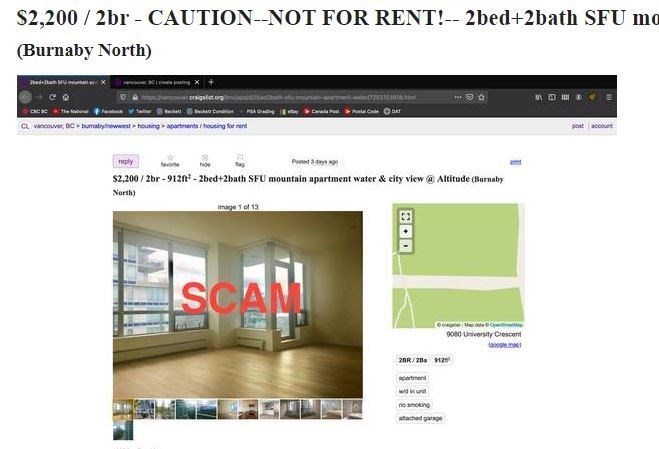A Burnaby resident is warning people that the place they see for rent online might not actually be real.
The resident told the NOW that he recently bought an apartment in the Brentwood area.
After the deal went through, he discovered the same unit being listed for rent on several rental websites for $1,900 a month.
The man has since posted on these sites to let people know the one-bedroom unit is not for rent.
Police agencies have said that the COVID-19 pandemic has led to people getting scammed because they do deals remotely to avoid face-to-face meetings. That, along with a shortage of available rentals, has led people to agree to rent a place and send a deposit before seeing it in person.
“People are desperate,” said the resident issuing the warning.
“You believe the owner or landlord is showing you the property you are interested in renting,” says the Vancouver Police Department. “Or maybe you live elsewhere and are unable to view the property in person before agreeing to rent it. You pay a deposit, but when you show up to move in, the property was never available for rent and you are out your deposit. If the price is too good to be true, or they ask for cash only, a cash security deposit, or money to be wired, that should be a red flag.”
Tips
- don't send money to anyone you have not met in person and/or for property you have not seen in person
- ask for identification from anyone showing you the property and write down their licence plate if they arrive by car
- search for owner information in the Land Titles office to confirm you are dealing with the owner
Pandemic aside, the loss of money, personal information, and perseverance of scammers continue with online purchase scams as the most riskiest of scams.
The BBB recommends adding a few precautionary steps to the New Year's resolution list, along with the weight loss and financial goals, to help make the upcoming days and months fraud-free.
- I resolve to be cautious with email. Be wary of unsolicited emails from a person or a company. Remember, scammers can make emails look like they are from a legitimate business, government agency, or reputable organization (even BBB!). Never click on links or open attachments in unsolicited emails.
- I resolve to never send money to strangers. If you haven't met a person face-to-face, don't send them money. This is especially true if the person asks you to transfer funds using a pre-paid debit card or a digital wallet. Money sent to strangers in this way is untraceable and once it is sent, there's no getting it back. Scammers will try to trick you into panicking – so before making a move, think the situation through.
- I resolve to do research before making online payments and purchases. When shopping online, or if asked to make a payment online, research the retailer before entering payment information. Ask: Is this a person or business I know and trust? Do they have a working customer service number? Where is the company physically located? Would I be making payments through a secure server (https://....com)? Have I checked to see if others have complained? Remember online shopping scams can come in different forms, be sure to read BBB's 2021 Online Purchase Scams Report to get yourself prepared.
- I resolve to use my best judgment when sharing my personal information. Sharing sensitive personal information with scammers opens the door to identity theft. Never share financial information, birthdate, address, Social Insurance number or health card number with an unsolicited caller. To explore more, read BBB tips on how to spot and avoid identity theft.
- I resolve to be social media smart. Online shopping scams flourish on social media during the pandemic. Make use of privacy settings on social media and only connect with people you actually know. Be careful about including personal information in your profile and never reveal the address and other sensitive information – even in a “fun” quiz. Scammers may use this information to make themselves pass as a friend or relative and earn your trust. Also, think twice before buying products you saw on social media. BBB Scam Tracker has received thousands of complaints about misleading Facebook and Instagram ads.
Follow Chris Campbell on Twitter @shinebox44.



